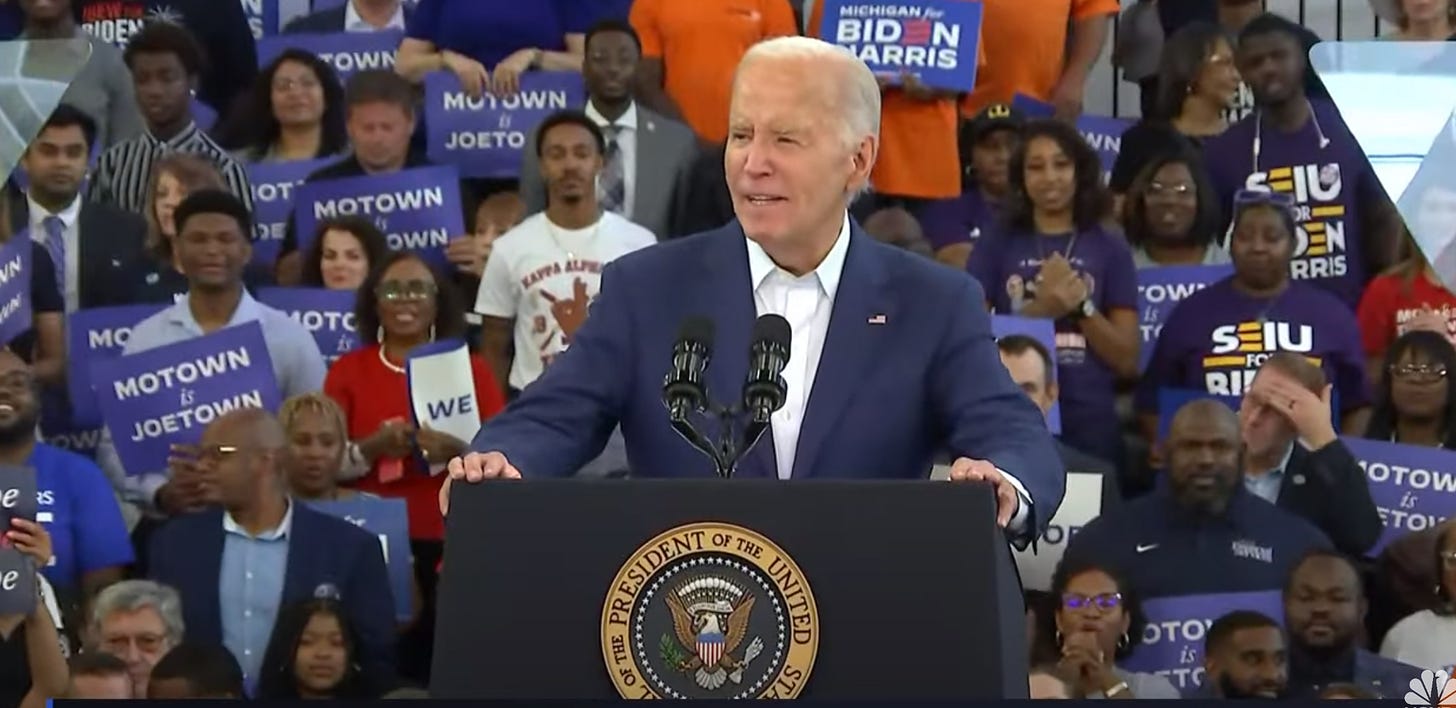At a campaign rally in Detroit, President Biden emphasized his achievements and drew stark contrasts between his leadership and former President Trump. He highlighted his administration's success in turning the economy around from the brink of recession, citing lower prescription drug prices, reduced healthcare premiums, significant student loan forgiveness, and a record number of people in the workforce. Biden highlighted nationwide infrastructure rebuilding, the first significant gun safety law in 30 years, and support for small businesses and historically black colleges and universities as key accomplishments.
Biden portrayed his leadership as compassionate and focused on serving the people, unlike Trump, whom he accused of promoting autocracy and misinformation. He outlined his administration's priorities, including protecting women's rights, voting rights, Medicare and Social Security, and expanding healthcare access. Biden also reaffirmed his commitment to banning assault weapons, combating corporate greed, and addressing climate change.
Looking ahead to a potential second term, Biden announced plans to restore Roe v. Wade, sign the John Lewis Voting Rights Act, expand Social Security, eliminate medical debt, raise the federal minimum wage, and make childcare tax credits permanent. He criticized Trump for his handling of the economy, the COVID-19 pandemic, and his actions during the January 6 Capitol attack, highlighting Trump's criminal convictions and fraud charges. Biden argued that Trump's proposals threaten democracy and personal freedoms.
Expressing strong support for labor unions, Biden cited his historic walk on a picket line and the creation of new auto and manufacturing jobs. He emphasized the importance of defending democracy, opposing Trump's autocratic tendencies, and ensuring that all Americans have a fair shot at success. The rally underscored Biden's vision for a second term focused on economic growth, social justice, and the protection of democratic values.
The Biden-Harris Administration has made significant strides in expanding access to capital and private contracting opportunities for underserved communities following Vice President Harris's 2023 call to action. A key achievement is the commitment by private companies and philanthropies to deposit $3 billion with Community Development Financial Institutions (CDFIs) and Minority Depository Institutions (MDIs) by 2025, up from $1 billion in 2023. Additionally, the State Small Business Credit Initiative (SSBCI) has played a crucial role, with over 40% of its loans and investments in 2022 and 2023 supporting minority-owned businesses, resulting in $3.2 billion in new financing for 3,600 small businesses. Under the Biden-Harris Administration, the Small Business Administration (SBA) has backed $35 billion in loans to over 68,000 minority-owned small businesses, marking a 13% increase from the previous administration.
The Economic Opportunity Coalition has committed to $3 billion in deposits to CDFIs and MDIs by 2025, deploying $850 million already. The 2024 Freedman’s Bank Summer Symposium at Shaw University highlighted local impacts in Raleigh, NC, and showcased the Administration's efforts to support underserved businesses. Minority business ownership has surged, with Black and Latino business ownership growing fastest in 30 years. Median net worth for Black families increased by 60% and 47% for Latino families from 2019 to 2022.
The Administration also achieved a record $850 million in federal procurement dollars allocated to small disadvantaged businesses (SDBs) in North Carolina in FY23. Community Advantage lending has expanded significantly, with the SBA providing over $4 billion in loans to more than 14,000 Black-owned small businesses, a 53% increase from the previous administration. Housing and community development efforts include over $1 billion allocated for various projects in North Carolina, with $137 million under the American Rescue Plan dedicated to affordable housing initiatives. These comprehensive efforts demonstrate the Administration's commitment to building an inclusive economy and supporting underserved communities and businesses nationwide.
The President signed into law:
H.R. 1240, the “Winnebago Land Transfer Act of 2023,” which takes certain land into trust for the benefit of the Winnebago Tribe of Nebraska;
and
H.R. 4581, the “Maternal and Child Health Stillbirth Prevention Act of 2024,” modifies the Maternal and Child Health Services Block Grant scope to include activities related to stillbirth prevention.
President Joe Biden announced the signing of S. 138, the "Promoting a Resolution to the Tibet-China Dispute Act." He emphasized the bipartisan commitment to human rights for Tibetans and preserving their cultural heritage. The administration urges China to engage in direct dialogue with the Dalai Lama to reach a negotiated agreement on Tibet. Biden clarified that this Act does not alter the U.S. policy of recognizing the Tibet Autonomous Region and other Tibetan areas as part of China, a decision under his authority.
President Biden delivers remarks at a campaign stop in Detroit, MI




